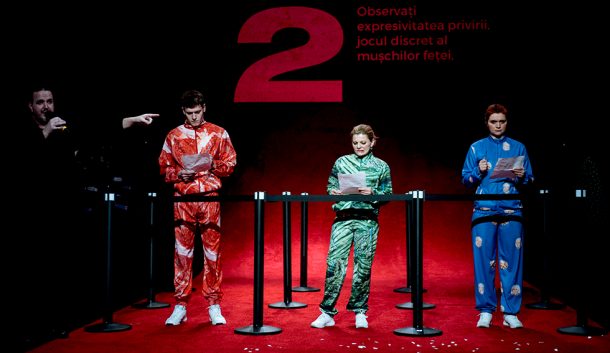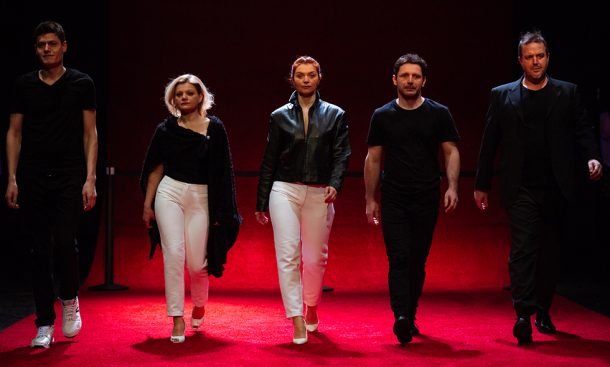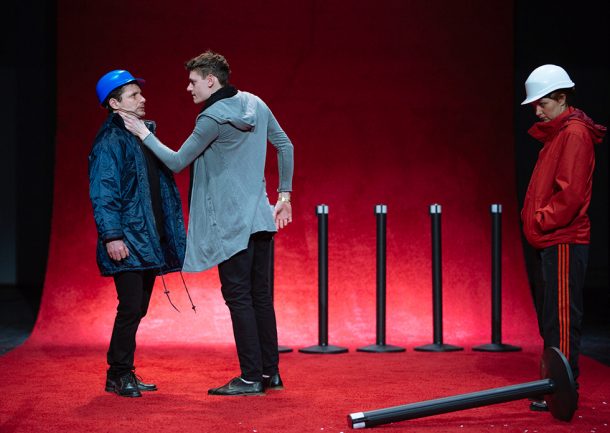Eastern Europe, 2017. Problems regarding the migration of the workforce have existed here for more than 20 years now and the global society has transformed them into some sort of octopus, with many long and complex tentacles, that generate complications challenging the imagination of your “average Joe.” And here we have a paradox, since it is precisely this average Joe who is the first to feel the effect of this problem, starting with his employment options and finishing with his consumer choices. I insist on the difficulty of anticipating the complications because as the labor market (and the society) is becoming global, the average Joe is getting more and more isolated in his narrow circle of social relationships and his options are becoming quite limited. The weltanschauung of the average Eastern European citizen is baffled by consumerism, by the struggle to get a decent paycheck, and by the delusion of the Western world that continues to be as fascinating in 2017 as it used to be before the Iron Curtain collapsed. The joining of the European Union by several countries in Eastern Europe should have stabilized the appetite for their citizens to look for jobs in the West, as the jobs in their own countries should have been better paid and more available. People expected much more from their economies in the East: strength and stability. They also expected that the gaps in societies would disappear. Beyond any statistics, it is clear that the myth of getting a well-paying job in the West still exists. Eastern Europeans still look towards the West as to some sort of El Dorado into which they desperately want to integrate despite all the difficult and complex problems the European Union is experiencing.
This is the background of Gianina Cărbunariu’s show Sprechen Sie Schweigen? (Do You Speak Silence?) that opened in February 2017 at Radu Stanca National Theatre in Sibiu (Romania), produced by the Romanian and German departments of theatre. Hence, it is a “linguistic” coproduction, and this might be considered the first pillar of the show: the complications that emerge when Eastern Europeans try to integrate into the tough labor market of the West. The method through which Gianina Cărbunariu opens her show emphasizes the real biographies of the actors: Emöke Boldizsár, Daniel Bucher, Ofelia Popii, Valentin Späth, and Marius Turdeanu. Each actor is presented by a stage partner, so that the trilingual cast (Romanian, German, and Hungarian) must confront small and comical short-circuits/accidents in the announcements that not only make the audience laugh, but help to warm up both the actors and the spectators. The shift to the serious problem of people trying to find decent jobs in the West is slow and is prepared for by an exercise of detachment by the actors’ biographies. This procedure is absolutely welcome, as the step into the characters’ biographies starts from an existing, rock-solid ground that is assumed by the actor: his/her own biography. All the jokes here depend on the linguistic barrier: the actor that is presented to the audience does not understand almost anything that is said about him. All this is a pretext for humor and small comical dissensions, but it is obvious that something serious and deep is going to happen later. It is also important to mention here the fact that each Romanian member of the cast is talking about a relative working in the West or about his/her own similar experience.

Gianina Cărbunariu’s Sprechen Sie Schweigen? (Do You Speak Silence?). Premiere: February 2017 at Radu Stanca National Theatre. Photo © TNRS Adrian Bulboacă.
Next we have two actresses on stage, talking about the advantages of working in Germany as caretakers for old people, but from the point of view of the recruiting agencies. Here, Gianina Cărbunariu is beginning to touch upon a cultural phenomenon, as these agencies have become very popular in Eastern Europe and are often selling dreams and hiring people to work in almost slave-like conditions. Of course, their presentation is very attractive and touches on all the ‘advantages’ of a job in the European Union: transportation, health care, insurance, a good paycheck, etc. Still, beyond all these, the audience will be touched by the artificiality of the situation and by the fact that the two women are selling beautifully packaged illusions. The lines are accompanied by gestures that are similar to those of flight attendants: each phrase talking about the ideal job in the West is doubled by a movement depicting the job’s activity, as if the two women are talking to naïve, desperate, and unintelligent clients. Needless to say, the audience begins to feel the social critique of the play in this particular scene and the actresses’ intention is to emphasize the fake glamor of the recruiting agencies. The two women presenting the wonderful opportunities in the West also share an interesting relationship, one being closer to the audience (the clients) than the other. More than creating a good cop/bad cop situation, Gianina Cărbunariu is very intelligent in presenting case studies for the audience. The play uses interviews as a documentary departure-point, so the situation of speaking silence is exposed from its very beginning: the moment when people trying to get a job in the West are nothing more than clients for a recruiting agency. This would be the first step in their long and difficult journey and now the audience is a part of this, as the two actresses are talking directly to the spectators, making them feel they are the target in their presentation speech.
Further on, we find the three characters in Germany, after they have been hired by the recruiting agency. Here, director Gianina Cărbunariu is again very smart and subtle in her social critique, as the three workers are walking on stage as on a special catwalk. They are presented by two men with microphones, telling the story of how the workers got to the West, of what their working conditions truly are and of how they have discovered some new annexes to their contracts. Of course, the dream is beginning to feel much more like an illusion, the expectations were exaggerated if not completely wrong, and the reality of their new job is a nightmare. Walking on the catwalk, with its red carpet, the three workers are tired and occasionally fall down of exhaustion, but the two men with microphones present them to the audience as being full of grace, successful, and happy. Even when the three workers fall, they are presented as “having the special opportunity to fall and be tired.”

Gianina Cărbunariu’s Sprechen Sie Schweigen? (Do You Speak Silence?). Premiere: February 2017 at Radu Stanca National Theatre. Photo © TNRS Adrian Bulboacă.
And now we get to the core of Gianina Cărbunariu’s play: the workers from Eastern Europe cannot integrate into the West and they will be alone, on their own, waiting for the paychecks and suffering many abuses. The characters’ biographies are generic and all of them are a result of the interviews the director conducted in Germany and in Romania. The case studies the play presents are just a sample of the abuses we hear about in the news and the result is the almost complete silence in which these people live. Therefore, the title of the play is not only a metaphor, but also a legitimate question.
We also need to pay attention to the set and the video projections, because they are both cleverly interrelated. There are subtitles, as the majority of the audience does not speak German well. Mihai Păcurar (set designer and also in charge with the video projections) has created a space using minimal means: a red carpet, some small pillars used to suggest crowd management (when they are connected with ribbons) and different kinds of work the Easterners do in the West. On the other hand, the video projections are used for much more than the subtitles, even if they only present the lines of the play: they emphasize parts of what some characters are saying through the use of different font sizes, as in some sort of advertisement.

Gianina Cărbunariu’s Sprechen Sie Schweigen? (Do You Speak Silence?). Premiere: February 2017 at Radu Stanca National Theatre. Photo © TNRS Adrian Bulboacă.
Gianina Cărbunariu, well-known throughout Europe for her strong social critique in theatre, has managed to create a show that makes use of minimal means of artistic expression in order to ask a question that is of huge importance in the European Union: do you speak silence? Of course, the spectators need to answer this question on their own. The play is a strong warning signal about delicate matters and I am sure there will be a lot of good and interesting reactions to it. My personal question and warning about the show is that it would be absolutely fantastic if the main audience would be precisely the workers that are abused. But, unfortunately, this category of spectators does not go to the theatre very often, as they are abroad, working and speaking silence.
is a Professor at “Lucian Blaga” University, Sibiu, and Head of the Department of Drama and Theatre Studies. He is member of the Centre for Advanced Studies in the Field of Performing Arts (Cavas). He has published studies, book reviews, theatre reviews, and essays in prestigious cultural magazines and academic journals in Romania and Europe. Since 2005, he has been co-editor of the annual Text Anthology published by Nemira Publishing House for each edition of the Sibiu International Theatre Festival. Since 2005, Mr. Tomuș is part of the staff at Sibiu International Theatre Festival (SITF is the third performing arts festival in the world, preceded by the ones in Edinburgh and Avignon).
European Stages, vol. 9, no. 1 (Spring 2017)
Editorial Board:
Marvin Carlson, Senior Editor, Founder
Krystyna Illakowicz, Co-Editor
Dominika Laster, Co-Editor
Kalina Stefanova, Co-Editor
Editorial Staff:
Cory Tamler, Managing Editor
Mayurakshi Sen, Editorial Assistant
Advisory Board:
Joshua Abrams
Christopher Balme
Maria Delgado
Allen Kuharsky
Bryce Lease
Jennifer Parker-Starbuck
Magda Romańska
Laurence Senelick
Daniele Vianello
Phyllis Zatlin
Table of Contents:
- Festival Transamériques, 2016: The Importance of Saying No by Philippa Wehle
- Ukrainian Contemporary Theatre as Cultural Renewal: Interview with Volodymyr Kuchynskyi, March 2015 by Seth Baumrin
- A Month in Berlin: Theatre for All Ages by Beate Hein Bennett
- New Productions and Revivals in Berlin by Yvonne Shafer
- An Experiment of Strangeness: The 2016 Interferences International Theatre Festival in Cluj by Eylem Ejder
- A (Self-)Ironic Portrait of the Artist as a Present-Day Man: The Newest Trademark Show of Gianina Cărbunariu in Bucharest by Maria Zărnescu
- Do You Speak Silence?, asks Gianina Cărbunariu in Sibiu, Romania by Ion M. Tomuș
- Une chambre en Inde (“A Bedroom in India”): A Collective Creation by the Théâtre du Soleil and Ariane Mnouchkine by Marvin Carlson
- Only When in Rome?: Albert Camus’ Caligula at the Theater Basel by Katrin Hilbe
- Terrassa’s TNT Festival: The New, the Usual and the Ugly by Maria M. Delgado
- Puzzling Perspectives On Ever-Shifting Conflict Zones by Talya Kingston
- Sister Act(s): Catholic Schoolgirls Rule by Duncan Wheeler
- Re-framing the Classics: La Cubana Reinvent Rusiñol and the Lliure Revisit Beaumarchais by Maria M. Delgado
- John Milton’s Comus: A Masque Presented at Ludlow Castle: Shakespeare’s Globe, London by Neil Forsyth
- Musical in Bulgaria: A Mission Possible by Gergana Traykova
- What Happens to Heroes: Heinrich von Kleist’s Prinz Friedrich von Homburg at Schauspiel Frankfurt by Katrin Hilbe
- Krystian Lupa and Thomas Bernard in Paris, Fall, 2016 by Manuel García Martinez
Martin E. Segal Theatre Center:
Frank Hentschker, Executive Director
Marvin Carlson, Director of Publications
Rebecca Sheahan, Managing Director
©2016 by Martin E. Segal Theatre Center
The Graduate Center CUNY Graduate Center
365 Fifth Avenue
New York NY 10016



